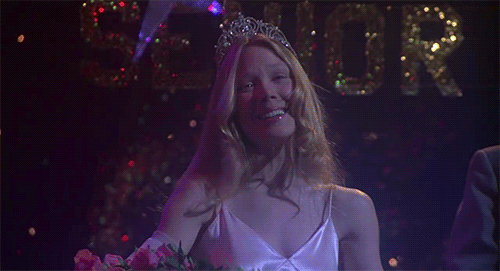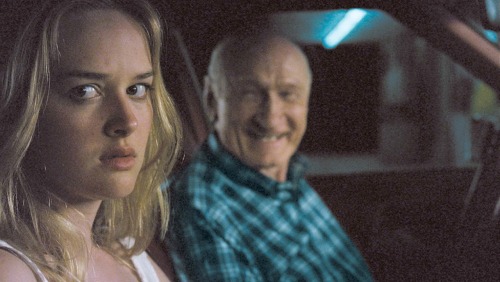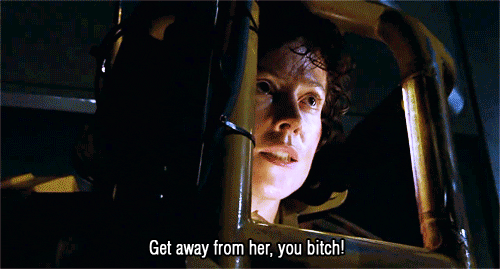Horror movies are often rife with gender stereotypes and cliches. It’s almost like casting a season of “The Real World.” In many of these movies, the women are pathetically one-dimensional, punished for past misdeeds. In Alfred Hitchcock’s “Psycho,” Marion Crane is hacked to the death in a shower. Can this be seen as an act of karma? In the beginning of the film, we learn that Marion has stolen $40,000 from her job. She happens upon the Bates Motel while on the lam. These movies often use female sexuality as the cause of violence. Fortunately, there are films that defy the low-bar expectations of the genre, utilizing female sexuality as a bleak reflection of a patriarchal society.
[divider] [/divider]
Carrie: Brian De Palma executes a near pitch-perfect rendition of Stephen King’s Carrie. Sissy Spacek gives the title character the depth required to turn this 1976 classic into a study of the perils of girlhood and female sexuality. Who can forget the scene in the locker room when Carrie gets her period for the first time? As a painfully sheltered girl with an intensely devoted religious fanatic of a mother (Piper Laurie), Carrie initially regards puberty as a form of humiliation. When she learns that her budding telekinetic powers are directly linked to the physical maturation of her body, Carrie embraces her gift, rebelling against her mother’s scare tactics. Although Carrie is a victim of the social hierarchy of suburban high school and her mother’s reign of terror, she is self-reliant. The mass murder at the prom is her revenge, the culmination of a lifetime’s worth of peer-induced bullying that fully illuminates the height of her powers.
Although it certainly contains elements of the typical horror movie, “Carrie” is unique in the sense that the female protagonist is not portrayed as a helpless agent of patriarchy and male supremacy. Unlike a slasher movie like “Nightmare on Elm Street” or “Friday the 13th,” the killings aren’t rooted in some mythical boogeyman. The true horror is not Carrie’s powers, but the cruelty of the people in Carrie’s life. Granted, Carrie is an automatic target due to her inability to conform to teenage social standards, but she refuses to let fear and ignorance govern her decisions.
[divider] [/divider]
Alien and Aliens: So it may not technically be a “horror movie,” but “Alien and Aliens” gave us Ellen Ripley, a woman who is by no means a damsel in distress. At the end of “Alien,” Ripley is the only member who manages to escape. What I find curious (in a positive way) about this movie is that Ripley is written in a way that shields her from the male gaze.
[divider] [/divider]
Scream: In Wes Craven’s “Scream,” Neve Campbell plays Sidney Prescott, the well-mannered girl-next-door who is targeted by a masked serial killer who may or may not be connected to her mother’s gruesome murder. Sidney is as much a stand-in for the audience as she is the quintessential victim. Like “Carrie,” Craven plays with the idea of female sexuality as a downfall. There’s even a callback to the impromptu “rules” of slasher movies: Virgins are protected from death. By the end of the movie, we learn that Sidney’s mother was killed by her boyfriend, Billy Loomis, because she was having an affair with Billy’s dad. Sidney is merely guilty by association. However, Sidney is no shrinking violet. Despite her soft-spoken manner, she’s not afraid to stand up for herself, as evidenced when she punches persistent news anchor, Gale Wethers, and later on, when she shoots Billy. Throughout the rest of the “Scream” series, Sidney is painted as a wounded but determined survivor, a woman who isn’t afraid to protect herself or her friends and family.
[divider] [/divider]

Teeth: Some may say that “Teeth” is more of a comedy than a straight horror movie. Dawn O’Keefe (Jess Weixler) has an unusual talent: she’s been blessed (or cursed) with vagina dentata, which basically means she’s literally got a killer vagina. Dawn’s affliction tackles the topics of misogyny. The viewer is meant to sympathize with Dawn; she’s not a monster but a young woman who is continuously under attack by the male oppressors in her life. Just about every man that Dawn encounters has nefarious intentions, from her stepbrother to her gynecologist. When Dawn throws out her purity ring, it symbolizes her detachment from the social construct of virginity and her adherence to feminine ideals.
[divider] [/divider]
Jennifer’s Body: Jennifer Check (Megan Fox) is not only beautiful and popular, but she eats boys. Her best friend, the mousy and insecure Needy Lesnicki (Amanda Seyfried), soon discovers her BFF’s zombie proclivity and vows to stop her. Not only does “Jennifer’s Body” offer interesting commentary on the adolescent friendships between girls, but it showcases female sexuality as a weapon, rather than a death wish.
[divider] [/divider]Honorable Mentions: “Ginger Snaps,” “Pan’s Labyrinth,” “Candyman,” “The Silence of the Lambs,” “Hostel 2”
[divider] [/divider]Who are your favorite women of the horror genre? Tweet us @litdarling.
Share this:
- Click to share on Tumblr (Opens in new window)
- Click to share on Twitter (Opens in new window)
- Click to share on Facebook (Opens in new window)
- Click to share on Reddit (Opens in new window)
- Click to email a link to a friend (Opens in new window)
- Click to print (Opens in new window)
- Click to share on Pocket (Opens in new window)
- Click to share on LinkedIn (Opens in new window)
- Click to share on Pinterest (Opens in new window)









